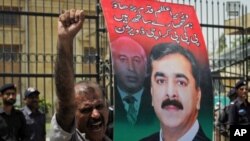Pakistani Prime Minister Yousuf Raza Gilani is refusing to step down, a day after the Supreme Court found him guilty of contempt for not reopening corruption cases against the country's president.
During a speech in parliament Friday, Gilani said his only crime was "protecting the constitution." He said only parliament has the authority to remove him from office, telling lawmakers he is an elected prime minister, representing Pakistan's 180 million people. Gilani challenged opposition lawmakers to bring a no-confidence vote against him.
The Supreme Court on Thursday gave the prime minister only a symbolic sentence of less than a minute's detention, sparing him a possible jail term of up to six months. His lawyer says the conviction will be appealed.
The court ruling triggered an immediate debate about Gilani's status as prime minister. Legal experts say the fact that he was sentenced to a prison term, even for less than a minute, makes him ineligible to sit in parliament for the next five years.
The parliamentary speaker and election commission must now decide whether Gilani can be dismissed as a lawmaker, and thus as prime minister. On Friday, he urged the speaker, who is a fellow member of the Pakistan People's Party, to "apply your own mind" in the case.
Opposition leaders, including former Prime Minister Nawaz Sharif, called on Gilani to step down, saying they will no longer accept him as the country's prime minister.
Thursday's guilty verdict is the latest development in what has been an ongoing battle between the court and the prime minister over the status of corruption cases dating back to the 1990s.
Prosecutors accuse President Zardari, former prime minister Benazir Bhutto and others of laundering millions of dollars through Swiss bank accounts. Bhutto, President Zardari's wife, was assassinated in 2007.
Charges against Zardari and the others were dropped after a 2007 amnesty agreement, but the court struck down the deal in 2009 and has been battling to reopen the cases ever since.
Prime Minister Gilani had refused to cooperate, arguing instead that the president has legal immunity while in office and that reopening the cases would be unconstitutional.
Some information for this report was provided by AP, AFP and Reuters.





